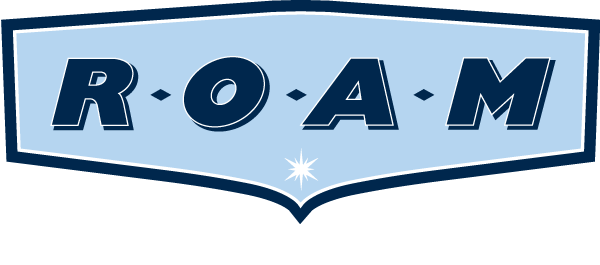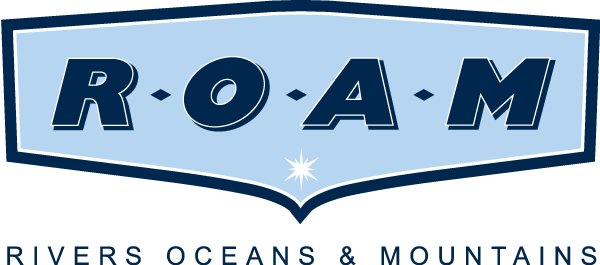Our Commitment to ROAMing Responsibly
ROAM understands how important the environment is to our operations, let alone mankind. Although we believed we were already environmentally responsible, after close self-examination we discovered other ways that we could improve our efforts. Constantly striving to be better, here are few things we have found to have tremendous impact on reducing our overall footprint.
Environmental Purchasing
Also known as ‘green procurement’, ROAM tries to purchase environmentally preferable products and services. Despite being more expensive, these green products are environmentally preferable through their components(recycled content), packaging (biodegradable or simply use less), production(less energy in production or less shipping), operation (require less energy to operate), or disposable (completely biodegradable).
Examples in practice:
- Using whole and organic foods
- Purchasing locally roasted, shade grown coffee, fair trade practices
- Utilizing local AAA meats and regional vegetables
- Using bio diesel fuel and diesel fuel additives
- Green cleaning products, responsible hand cleaners, paints, bags and containers
- Recycled paper products, recycled clothing content
- Filtered local water in re-useable containers
- Many of our lodges have their own greenhouses, were built from reclaimed materials and utilize geothermal and solar energy
Solid Waste Reduction
ROAM is preventing or decreasing the amount of waste generated through recycling, composting and purchasing recycled products. By generating less waste we also dispose of less waste. Our recycling initiatives do not stop there. All monies collected for recycled materials are donated to a guide training initiative for the local First Nation youth. These funds help pay for access to comprehensive guide training and first aid programs.
Examples in Practice:
- We have opted for a digital workplace and stopped producing large catalogs.
- Online reservations and e-processing reduces mailing hard copies
- Bulk buying to avoid excessive packaging
Reusing:
- ROAM reuses boxes and other trip packaging materials
- We use reusable flatware, water bottles and camping commissary
- We compost all of our organic matter at warehouse operations and lodges
Recycling:
All recyclable materials are being cashed in and the funds applied to a bursary for training local guides.
Examples in Action:
- In all of our radios and flashlights we utilize recyclable batteries.
- In Galapagos we have a program in place to distribute unwanted footwear of our North American guests. Two Galapagos-based guides have been running their own Reuse-a-Shoe program and getting local children and adults into top quality used footwear donated by our guests.
- In Peru we are contributing to a local recycling program for the Inca trail. This provides villagers an income for hauling debris and recycling products.
- In Ecuador we are developing a recycling incentive program to persuade local fisherman to bring their garbage and recycling back rather than tossing it in the sea.
Pollution Prevention
- ROAM has been working on programs to reduce or eliminate waste at the source by modifying production processes, promoting the use of non-toxic or less toxic substances and implementing conservation techniques.
- For fishing operations, drift boats are used when powerboats can be avoided. If required, 4-stroke boat engines are used. These engines are quieter and more fuel efficient, but most importantly have lower emissions.
- Alternative fuels such as bio-diesel or ethanol blended gasoline are used in company trucks where ever possible.
- Greenhouse gas offsets are a hot topic in general. We decided to plant a tree for every guest who travels with ROAM. This is a small gesture, but a worthy one and seems less hypocritical than buying carbon offsets for polluters.
Environmental Education
Our guests sign up for trips to relax and have fun. We also believe it is an added benefit if you learn a few things along the way as it increases the value of the experience.
Leave No Trace – ROAM follows a “leave no trace” policy. Although no adventure activity can be impact free, our expeditions leave the smallest footprint possible. All of our garbage and waste is taken out after each trip. In many cases, archaeological impact assessments have been undertaken to assess what kind of impact our programs may be having on the environment we utilize commercially.
Energy & Water Conservation
Although we are blessed with ample water in Canada and Alaska, our Latin American operations have taught us what a precious resource this is.
When the construction of a hydroelectric plant threatened the Klinaklini watershed, it was a urgent reminder as to why we should conserve energy when ever possible. The initiatives so far – long life bulbs, propane-powered generators and rechargeable battery systems – have provided tremendous cost savings as well.
ROAM also supports a number of worthy environmental initiatives:
- Being Caribou
- Project Wilderness Defence
- River Keepers
- Nature Conservancy
- CPAWS

